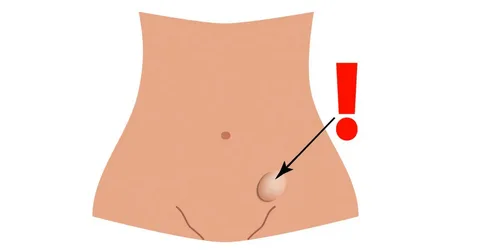An inguinal hernia occurs when abdominal tissues or organs protrude through a weak spot in the lower abdominal wall. It commonly presents as a visible bulge in the groin area accompanied by pain and discomfort. One of the most prevalent types of hernias, inguinal hernias can affect both men and women for various reasons.
What Is an Inguinal Hernia?
Medically referred to as an inguinal hernia, this condition arises when inner tissues like intestines, fat, or the abdominal membrane push through weakened areas in the lower abdomen. Though more frequent in men, inguinal hernias can also occur in women, especially due to pregnancy, heavy lifting, or chronic constipation.
Common Causes of Inguinal Hernias
- Congenital or genetic abdominal wall weakness
- Frequent heavy lifting
- Chronic constipation or straining
- Pregnancy
- Chronic coughing (e.g., COPD)
- Prostate disorders in men
- Previous abdominal surgeries
In men, the hernia often extends through the inguinal canal toward the scrotum.

Symptoms of Inguinal Hernias
- Swelling or bulge in the groin (more visible when standing, disappears when lying down)
- Pain or burning sensation in the bulge
- Discomfort aggravated by standing, coughing, or exercise
- Pain radiating to the thigh, lower abdomen, or testicles in men
What Happens If an Inguinal Hernia Ruptures?
A “ruptured hernia” is medically known as a strangulated hernia and requires immediate intervention. Symptoms include:
- Sudden, severe groin pain
- Hardened or discolored bulge
- Nausea, vomiting
- Fever
- Inability to pass gas or stool
How Is an Inguinal Hernia Treated?
Surgical intervention is the only permanent solution.
Comparison of Inguinal Hernia Surgery Methods
| Feature | Open Surgery | Laparoscopic Surgery |
|---|---|---|
| Incision size | Larger single incision | Several small incisions |
| Recovery time | 2–4 weeks | 1–2 weeks |
| Pain level | Moderate | Less |
| Scarring | More visible | Minimal |
| Risk of recurrence | Low | Low |
| Suitability | All hernia types | Select patients |
| Hospital stay | 1 day | Same day or 1 day |
1. Open Inguinal Hernia Surgery
A direct incision is made over the hernia site, and the protruding tissue is repaired with or without mesh placement.
2. Laparoscopic (Minimally Invasive) Surgery
Performed via small incisions with a camera and instruments, this approach offers quicker recovery and better cosmetic outcomes.
Can an Inguinal Hernia Be Treated Without Surgery?
Non-surgical approaches (e.g., trusses, activity modification) may provide temporary symptom relief but do not offer a permanent cure. Surgery is essential to fully correct the hernia.
Recovery After Inguinal Hernia Surgery
- Mild pain and swelling for a few days
- Discharge usually the same day or next
- Light activities within 1–2 weeks
- Avoid heavy lifting for 4–6 weeks
- Faster recovery after laparoscopic surgery
- Post-operative follow-up is essential
Inguinal Hernia in Men vs. Women
- More common in men due to weaker inguinal canals
- In women, it may be mistaken for ovarian issues
- Both sexes should monitor even mild symptoms as hernias can progress

Cost of Inguinal Hernia Surgery in Turkey
Hernia surgery costs vary based on the technique used (open or laparoscopic), size and type of hernia, and patient health. For personalized pricing and treatment plans, contact our clinic at +90 212 241 46 24.
FAQ
Does an inguinal hernia cause pain?
Yes, especially after physical activity. Advanced cases may cause chronic pain.
Will it heal on its own?
No. Hernias tend to grow. Surgery is the only definitive treatment.
What are the signs of inguinal hernia in women?
Swelling, fullness, and intermittent groin pain, sometimes confused with gynecological issues.
Can hernias recur after surgery?
With proper technique, recurrence is low, but strain may increase the risk.
Is a ruptured hernia an emergency?
Yes. Strangulation can lead to organ loss and requires urgent surgery.
![dr.leyla-arvas-800×1000.jpg[1] dr.leyla arvas](https://www.quartz.com.tr/wp-content/uploads/2024/11/dr.leyla-arvas-800x1000.jpg1_.webp)
Author : Op. Dr Leyla ARVAS
Dr Leyla Arvas is an internationally recognised specialist in aesthetic surgery based in Istanbul. Graduated in 1998 from Istanbul University Faculty of Medicine, she has developed her expertise by studying in Taiwan, Japan and Spain during her 20 years of experience.
This article March 4, 2026 was updated on
Editor: admin@quartz.com.tr


